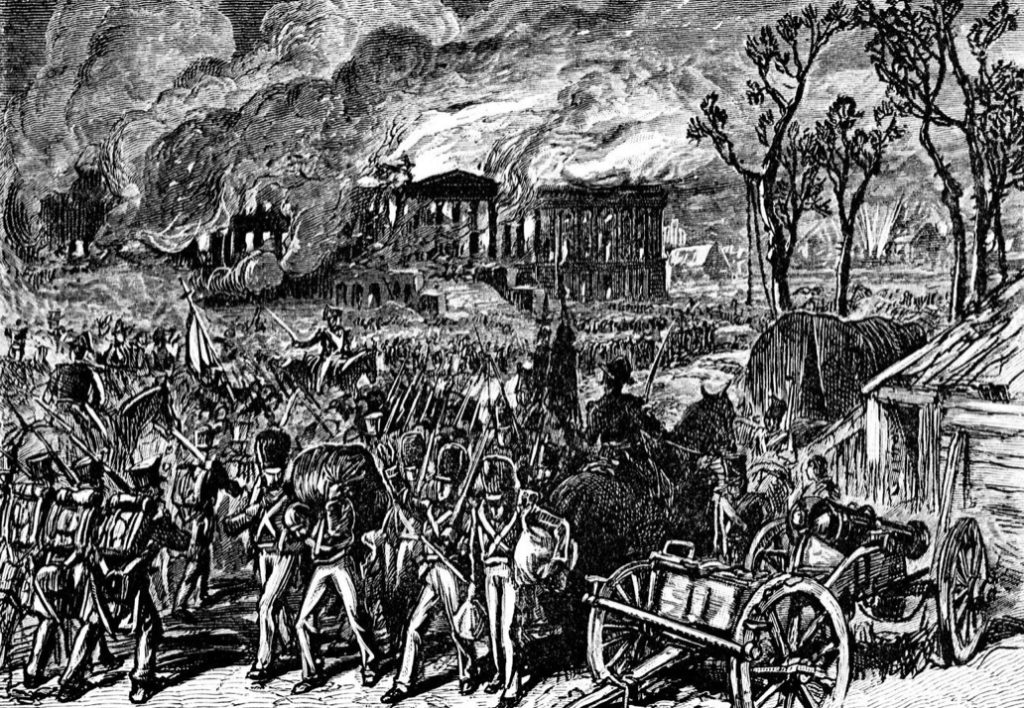Aru Venogopalan ‘24 | Brendan Schlitt ‘24 | Colin Schlitt ‘24
British forces broke into the US Capitol and burned it to the ground on August 24, 1814 during the war of 1812. 207 years later, another attack against the seat of American democracy was repeated, but this time it was staged by domestic insurrectionists rather than foreign invaders.

Despite this difference, there are some key similarities between the insurrection on January 6th and the 1814 attack. During both incidents, defenders of the Capitol were overmatched and overrun, allowing enemies to breach the building and cause significant damage. Additionally, the incident in 1814 provoked future turmoil and also served as a reminder of the flaws in its government, similar to January 6th’s insurrection. Vince Vento ‘21 adds, “[The British] were clearly our enemy in that war and they burned the Capitol as a way to make a statement against our government. That’s really similar to what the insurrection caused earlier this month, and that means you could liken them to enemies of the state because they’re trying to use our own Capitol building and our own safety against us.”
The War of 1812 and the burning of the capitol was a setback which forced Americans to re-evaluate their strength as a nation just as this year’s insurrection has caused many to question the stability of our institutions and political system.
In both events, the damage on the Capitol was measured by the amount of destruction to the art and prized possessions within.The British and American rioters both stole prized possessions from our Capitol. On January 6th, rioters took the Lectern of the Speaker of the House and vandalized busts and statues of former presidents. The British rioters of 1814 stole many pieces of artwork and other small statues. These items seem insignificant, due to the fact that they are replaceable; however, the meaning behind these items are much larger. They represent the American people and the values of our nation. Josephine Buccini ‘21 adds, “I think that for a party that claims to love American history, it’s terrible that the far right willingly destroyed the art and architecture that is part of our history.”
Although there are some key similarities between the events that unfolded on January 6th and the Capitol Burning of 1814, these two moments in history have some key distinctions. The Capitol burning in 1814 was an external struggle, as the US supported France in its war against Britain, thus leading the British to stage an attack on Washington D.C. January 6th, in contrast, was an internal struggle. Rioters supporting former President Trump stormed the Capitol in retaliation to what they thought was an unfair election. They challenged the American democracy and the nation’s core beliefs in a free and fair election.
Another difference is the question of accountability. For situations this volatile, there is always a catalyst of some sort, making it very hard for there to be no accountability. In the Capitol burning of 1814, the people tasked with protecting the Capitol were held accountable for their failures. In recent events, no one has been held accountable including former President Trump who is likely to be acquitted by the U.S. Senate, despite the fact that many allege his rhetoric was a direct cause of the attack.
The US has endured many difficult events, coming out of each struggle stronger and more unified. After the War of 1812, the US evolved, proving the validity of its democratic experiment and soon becoming a dominant world power. Similarly, the US is coming out of January’s insurrection focused on creating a better future. In President Biden’s Inaugural Address, he exhorted Americans to “write an American story of hope, not fear; of unity, not division; of light, not darkness; a story of decency and dignity, love and healing, greatness and goodness.” Sona Bardakjian ‘21 believes “strength and unity are the two most important things to have right now. If we want to move past these difficult events, we all need to acknowledge our mistakes to create a better future.”